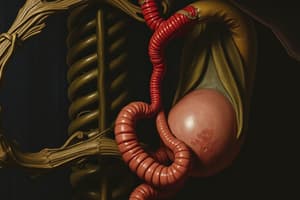Podcast
Questions and Answers
What is the primary purpose of excretion in the body?
What is the primary purpose of excretion in the body?
- To regulate blood pressure
- To maintain a constant internal environment
- To prevent the accumulation of poisonous wastes (correct)
- To produce hormones for metabolism
In urine production, what is the correct order of the stages?
In urine production, what is the correct order of the stages?
- Reabsorption, filtration, collection
- Collection, filtration, reabsorption
- Filtration, collection, reabsorption
- Filtration, reabsorption, collection (correct)
Which organ is primarily responsible for secreting the antidiuretic hormone (ADH)?
Which organ is primarily responsible for secreting the antidiuretic hormone (ADH)?
- Hypothalamus
- Kidney
- Liver
- Pituitary gland (correct)
What role does osmoregulation play in the excretory system?
What role does osmoregulation play in the excretory system?
What is the function of the renal artery in the excretory system?
What is the function of the renal artery in the excretory system?
Which substances are NOT able to enter the Bowman's capsule during the filtration process?
Which substances are NOT able to enter the Bowman's capsule during the filtration process?
How does the hypothalamus contribute to the excretory process?
How does the hypothalamus contribute to the excretory process?
What happens to ADH production when there is a high concentration of salt in the blood?
What happens to ADH production when there is a high concentration of salt in the blood?
Flashcards are hidden until you start studying
Study Notes
Homeostasis and Excretion
- Homeostasis refers to the maintenance of a constant internal environment within the body.
- Excretion is defined as the removal of metabolic waste from the body.
Secretion and Hormones
- Secretion involves the production and release of specific chemicals from cells.
- The pituitary gland secretes antidiuretic hormone (ADH), which regulates water reabsorption in the kidneys.
Role of Excretion in Homeostasis
- The excretory system plays a critical role in preventing the buildup of toxic wastes that could disrupt metabolic processes.
Osmoregulation
- Osmoregulation is the process of maintaining the balance of water and salts, such as potassium, in the bloodstream.
Renal System Functions
- The renal artery carries blood, rich in waste, from the aorta to the kidneys.
- Kidneys perform three main functions: filtering blood, controlling osmoregulation, and reabsorbing necessary substances.
- The bladder serves to store urine until it is expelled from the body.
- The urethra is responsible for carrying urine out of the body.
Nephron Structure and Function
- Nephrons, the functional units of the kidneys, are primarily located in the renal cortex.
- The main function of the nephron is to produce urine through a three-stage process: filtration, reabsorption, and collection/excretion.
Filtration Process
- During the filtration stage, substances such as proteins and blood cells do not enter Bowman's capsule.
Brain Regulation of Osmoregulation
- The hypothalamus detects changes in salt concentration in the blood.
- The pituitary gland secretes ADH in response to blood salt concentration levels.
ADH Production and Urine Volume
- High blood salt concentration triggers the secretion of ADH, leading to a low volume of urine production.
- Low blood salt concentration decreases ADH production, resulting in a higher urine volume.
Studying That Suits You
Use AI to generate personalized quizzes and flashcards to suit your learning preferences.




